You’ll benefit most from mindfulness meditation, which reduces anxiety and enhances emotional health while strengthening memory and attention span. Breathing techniques like the 4-7-8 method improve cognitive function and sleep quality, while body scan meditation helps manage pain and builds emotional resilience. Loving-kindness meditation combats loneliness and depression, and movement-based practices like chair yoga and Tai Chi improve balance, flexibility, and cardiovascular health. These evidence-based approaches offer thorough support for aging gracefully and maintaining well-being throughout your later years.
Mindfulness Meditation for Stress and Anxiety Relief

While aging brings unique challenges like health concerns and major life changes, mindfulness meditation offers older adults a proven pathway to reduce stress and anxiety.
You’ll find that regular mindfulness practice considerably decreases anxiety symptoms while enhancing your emotional health. Research shows these meditation techniques effectively quiet negative thoughts, creating tranquility and deeper self-awareness.
When you engage in mindfulness meditation, you’re actively regulating your breathing and heart rate through focused body awareness. This physiological response directly counters stress markers in your system.
Meta-analyses confirm that mindfulness-based programs consistently improve mood and life satisfaction among seniors. You’ll discover that consistent practice doesn’t just manage anxiety—it transforms your overall well-being, helping you navigate life’s changes with greater calm and resilience.
Breathing Techniques to Enhance Mental Clarity
How can something as simple as breathing transform your mental sharpness? Breathing techniques offer powerful tools for enhancing mental clarity by delivering increased oxygen to your brain, supporting peak cognitive function.
Unlock your brain’s potential through the simple yet profound practice of intentional breathing for enhanced cognitive performance.
When you practice focused breathing exercises, you’ll improve your attention span and reduce distractions that cloud your thinking.
Deep abdominal breathing and controlled methods like the 4-7-8 technique—inhaling for 4 seconds, holding for 7, exhaling for 8—promote calmness while boosting cognitive performance. These practices excel at stress reduction, lowering anxiety levels that interfere with clear decision-making.
Regular breathing exercises also promote neuroplasticity, keeping your brain adaptable and sharp as you age.
You’ll find these simple yet effective techniques naturally integrate into daily routines, providing immediate benefits for mental clarity.
Body Scan Meditation for Pain Management
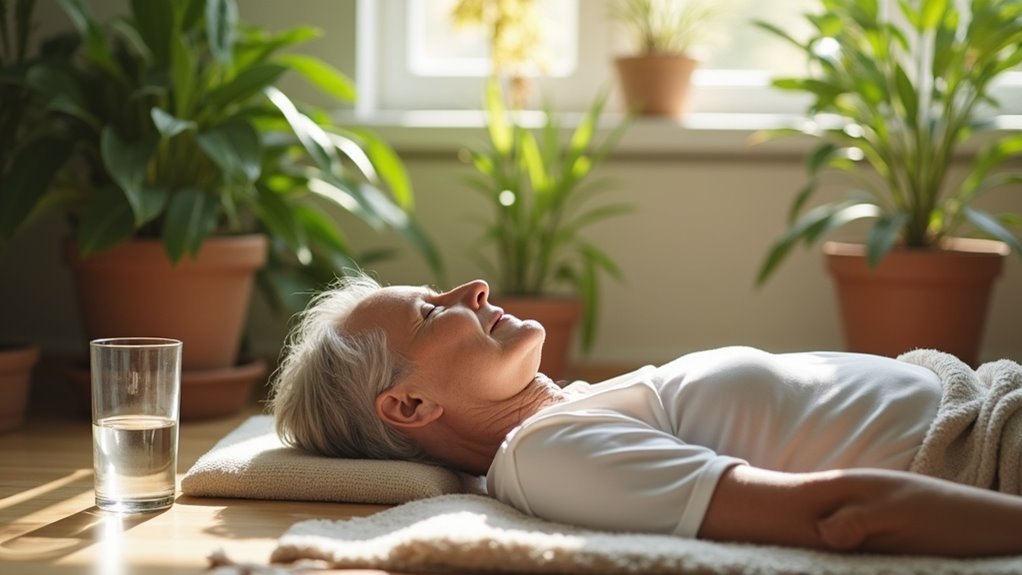
As you settle into body scan meditation, you’re engaging with a powerful mindfulness technique that can transform how you experience chronic pain. This practice involves systematically focusing on different body parts, promoting relaxation and heightened awareness of physical sensations.
Research demonstrates that mindfulness-based stress reduction programs incorporating body scan meditation lead to significant pain improvements in older participants.
You’ll discover that pain isn’t constant but variable, helping you develop better coping strategies. The deep mind-body connection you cultivate reduces stress levels, which directly impacts pain perception.
Regular practice enhances your emotional resilience, contributing to improved quality of life. Through consistent engagement, you’re not just managing discomfort—you’re fundamentally changing your relationship with pain while building lasting tools for wellness.
Loving-Kindness Meditation for Emotional Well-Being
Three simple phrases can transform your emotional landscape and reshape how you connect with yourself and others.
Loving-kindness meditation cultivates compassion through directed well-wishes, starting with yourself before extending to loved ones, strangers, and difficult people. This practice greatly enhances emotional well-being by reducing loneliness, anxiety, and depression that often affect older adults post-retirement.
Loving-kindness meditation begins with self-compassion, then radiates outward to heal loneliness and anxiety through directed well-wishes.
You’ll develop stronger emotional resilience as you regularly practice these compassionate intentions, helping you navigate aging’s challenges with greater ease.
Research shows loving-kindness meditation boosts life satisfaction and happiness while fostering meaningful connections with others. By incorporating this meditation into your daily routine, you’ll experience improved mental health outcomes and discover a renewed sense of community.
The practice creates lasting positive changes in how you relate to yourself and the world around you.
Movement-Based Practices for Physical Health
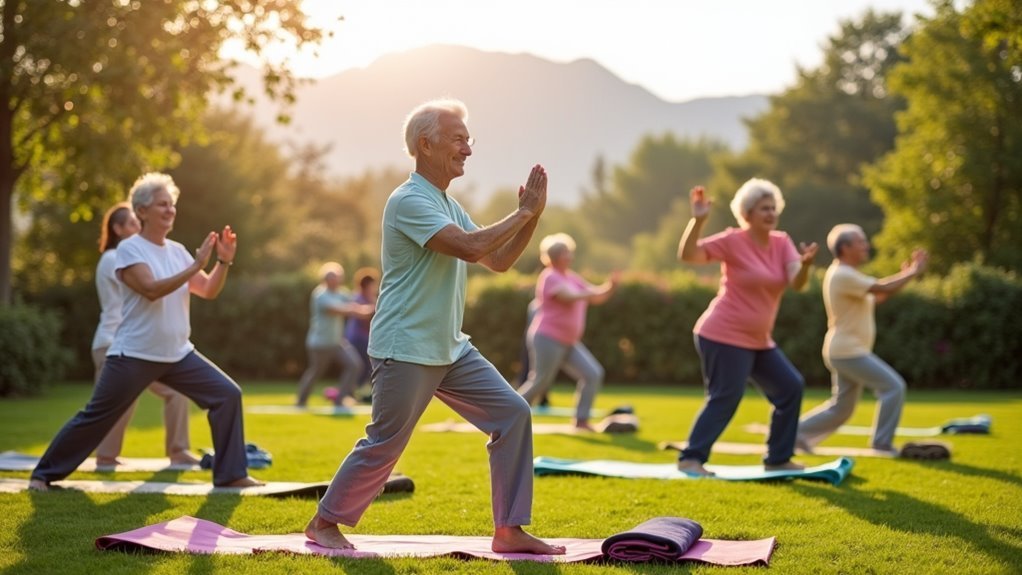
You can maintain your physical health and independence through movement-based meditation practices that combine gentle exercise with mindfulness.
Chair yoga offers you modified poses that improve flexibility and strength without requiring you to stand or get on the floor.
Tai chi provides flowing movements that enhance your balance and coordination while reducing fall risk.
Chair Yoga Benefits
When mobility becomes challenging with age, chair yoga offers a powerful solution that transforms any seat into a gateway for improved physical health. This gentle practice combines mindfulness with accessible movement, delivering remarkable health benefits that enhance your overall quality of life.
| Physical Benefits | Mental Benefits | Sleep Benefits |
|---|---|---|
| Enhanced strength | Stress reduction | Better sleep quality |
| Improved flexibility | Anxiety relief | Reduced insomnia |
| Better balance | Mental clarity | Restorative rest |
| Fall prevention | Enhanced focus | Deeper relaxation |
| Increased mobility | Cognitive improvement | Sleep consistency |
Chair yoga incorporates mindful breathing and body awareness while you remain comfortably seated. Research demonstrates significant improvements in mobility and physical well-being among seniors who practice regularly. You’ll experience reduced fall risk through enhanced balance and strength, while the meditative aspects promote relaxation and emotional wellness.
Tai Chi Movements
As gentle flowing movements replace jarring exercises, Tai Chi emerges as an ideal meditation practice that seamlessly blends mindful movement with profound health benefits for older adults.
You’ll discover that these slow, deliberate motions enhance your balance, flexibility, and strength while reducing fall risks. Your cardiovascular health improves through better circulation and lowered blood pressure, particularly beneficial if you’re managing mild hypertension.
Tai Chi’s mindfulness component helps you develop greater body awareness while alleviating chronic pain from arthritis and joint discomfort.
You’ll experience reduced anxiety and depression symptoms through this meditative practice. Additionally, regular Tai Chi sessions support your cognitive function by improving attention and memory, making it an excellent choice for maintaining both physical and mental wellness as you age.
Mantra Meditation for Better Sleep Quality
You’ll find that repeating a simple mantra naturally loosens physical and mental tension that builds up throughout your day.
Creating a consistent bedtime ritual with mantra meditation signals your body it’s time to shift from active stress patterns into restful sleep mode.
This practice effectively interrupts the cycle of daily worries and physical strain that often keeps older adults awake at night.
How Mantras Reduce Tension
Since racing thoughts and physical tension often prevent older adults from achieving restful sleep, mantra meditation offers a gentle yet powerful solution through the repetitive chanting or silent recitation of calming words or phrases.
When you practice mantra meditation, you’ll discover it can reduce tension by creating a rhythmic pattern that naturally calms your nervous system and lowers your heart rate. This repetitive nature helps quiet your mind’s chatter, replacing anxious thoughts with focused intention.
- Physical relaxation: The steady rhythm decreases muscle tension throughout your body
- Mental clarity: Repetitive phrases redirect your focus away from daily worries and stress
- Nervous system reset: Consistent practice activates your body’s relaxation response
Regular mantra meditation enhances your emotional well-being while greatly improving sleep quality, creating the peaceful change your body needs for restorative rest.
Creating Peaceful Sleep Rituals
Building on these tension-reducing benefits, you can transform your bedtime routine by incorporating specific mantra meditation practices that signal to your body it’s time to wind down. Creating consistent sleep rituals helps regulate your sleep cycles and promotes deeper relaxation for older adults.
| Time | Mantra Practice | Duration |
|---|---|---|
| 30 min before bed | “I release today’s worries” | 5 minutes |
| 20 min before bed | “My body feels calm and heavy” | 10 minutes |
| 10 min before bed | “Sleep comes easily to me” | 5 minutes |
| In bed | “Peace flows through me” | Until sleep |
This structured approach to mantra meditation enhances sleep quality by establishing predictable cues your mind recognizes. You’ll find yourself falling asleep faster and staying asleep longer when you consistently practice these peaceful rituals.
Releasing Daily Stress Patterns
When daily stressors accumulate in your mind and body, mantra meditation offers a powerful tool to consciously release these patterns before they interfere with your sleep. By repeating calming phrases or sounds, you’ll focus your thoughts away from the day’s tensions and create space for relaxation.
This practice specifically helps older adults shift from active stress states to peaceful mental conditions necessary for quality rest.
Research demonstrates that regular mantra meditation greatly reduces insomnia symptoms while improving overall mental health outcomes for seniors.
The repetitive nature of mantras helps:
- Release physical tension stored throughout your body from daily activities
- Lower anxiety levels that often spike during evening hours
- Create consistent bedtime routines that signal your brain to prepare for sleep
This meditation approach builds emotional resilience over time.
Focused Attention Practices for Cognitive Function
As you age, maintaining sharp cognitive abilities becomes increasingly important, and focused attention practices offer a scientifically-backed pathway to preserving and even enhancing your mental acuity.
Mindfulness meditation strengthens your attention span and memory retention while increasing gray matter in your hippocampus—the brain region essential for memory formation.
When you practice focused attention regularly, you’ll notice improved executive functioning, leading to better decision-making and problem-solving abilities.
These practices train your mind to sustain focus on the present moment, reducing distractions and boosting task completion rates. Research published in Frontiers in Human Neuroscience confirms these cognitive benefits.
Beyond mental sharpness, focused attention meditation enhances your emotional resilience, contributing to a more positive mindset and improved quality of life as you navigate aging.
Group Meditation for Social Connection and Support
While individual meditation offers profound personal benefits, joining a group meditation practice opens the door to meaningful social connections that can transform your aging experience.
When you participate in group sessions, you’ll discover a supportive community that understands your journey and shares similar goals.
Group meditation creates powerful bonds through shared mindfulness practices, offering you:
Shared mindfulness practices forge meaningful connections that strengthen your meditation journey and create lasting bonds with like-minded practitioners.
- Enhanced motivation – Peer accountability keeps you committed to regular practice
- Emotional support – Fellow participants provide understanding and encouragement during life’s challenges
- Cognitive stimulation – Group discussions and insight-sharing engage your mind beyond meditation itself
Research shows that these social connections considerably reduce loneliness while building emotional resilience.
You’ll find that managing aging’s challenges becomes easier when surrounded by others who share your commitment to mindful living and personal growth.
Frequently Asked Questions
Does Meditation Help the Elderly?
Yes, meditation helps you as an elderly person by reducing anxiety, improving sleep quality, managing chronic pain, enhancing cognitive function, and boosting your overall mood and life satisfaction considerably.
What Is the Oldest Meditation Technique?
You’ll find Vedic meditation is considered the oldest technique, originating around 1500 BCE in ancient India. It’s part of Hindu scriptures called the Vedas and focuses on sound and mantra repetition practices.
What Are the Benefits of Mindfulness for Seniors Mental Health?
You’ll experience reduced depression and anxiety through mindfulness meditation. It enhances your emotional resilience, improves memory specificity, reduces rumination, and increases happiness while promoting overall mental well-being and quality of life.
How Do You Teach Mindfulness to the Elderly?
You’ll start with simple breathing exercises and body scans. Set up guided sessions using apps, create quiet spaces, and encourage daily practice. Include gentle movement like chair yoga for better engagement and results.
In Summary
You’ve got powerful tools at your disposal to enhance your golden years through meditation. Whether you’re seeking stress relief, better sleep, pain management, or stronger social connections, there’s a practice that’ll meet your needs. Start with what resonates most—maybe gentle breathing exercises or group sessions. You don’t need perfection; consistency matters more. These practices will help you age gracefully while maintaining mental sharpness, emotional balance, and physical well-being throughout your later years.

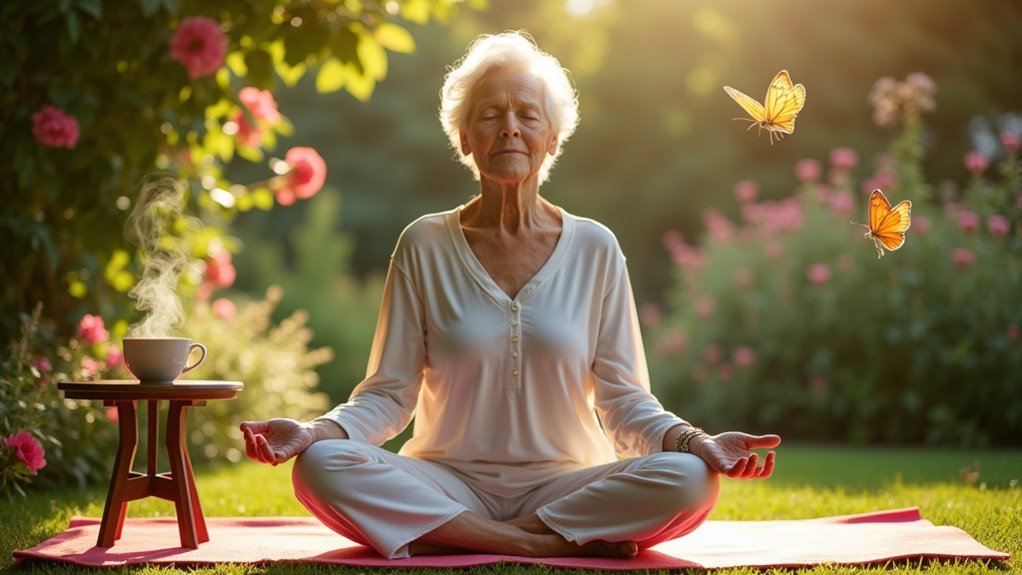
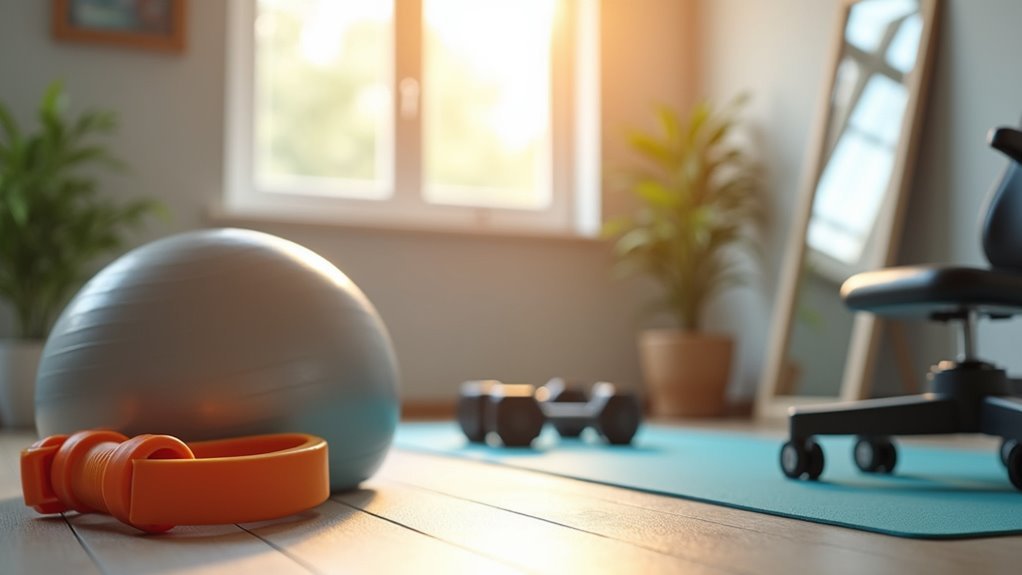
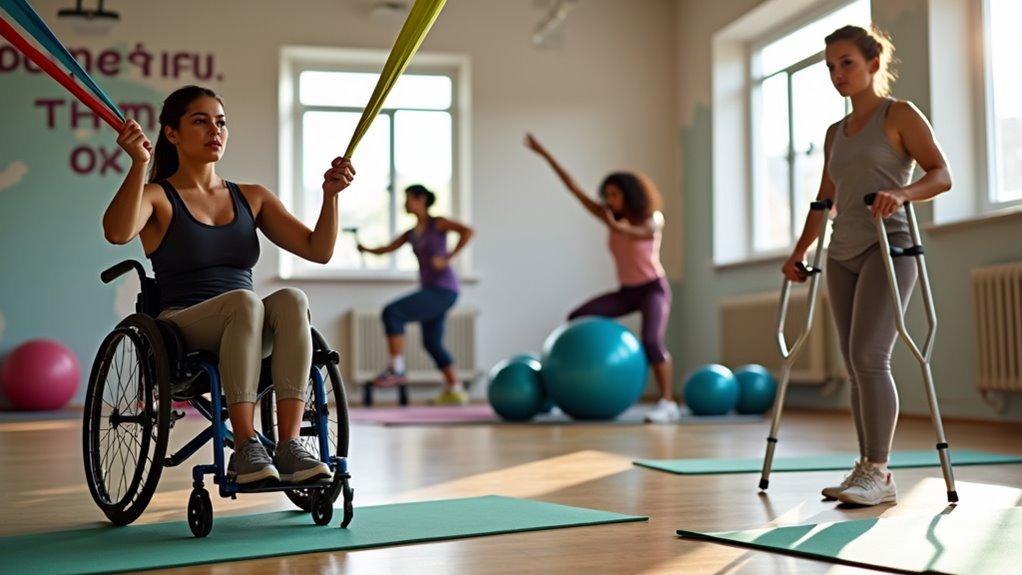
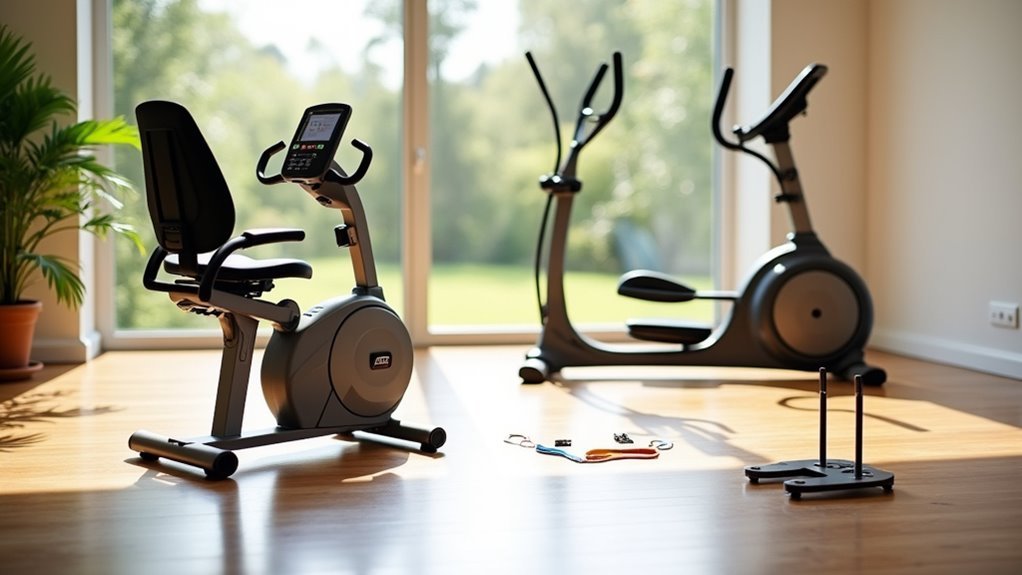
Leave a Reply